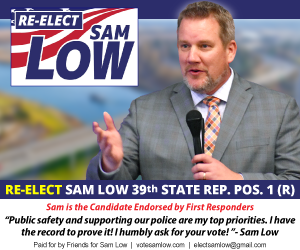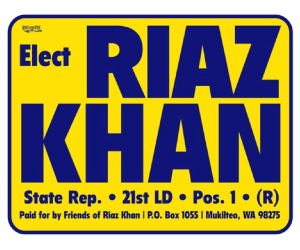UPDATE: [9:54 a.m. Dec 15, 2021] Lynnwood Mayor Christine Frizzell sends letter of support to county council.
SNOHOMISH COUNTY, Wash., December 14, 2021 – Ahead of Wednesday’s county council vote, 58 local elected officials from 20 jurisdictions throughout Snohomish County have signed a letter opposing the effort to increase the countywide sales tax in Snohomish County without a vote of the people.
The letter, sent to the County Executive Dave Somers and council Monday evening, asks that the proposed sales tax increase be placed on an upcoming ballot for a public vote.
“We encourage the County Council to place this issue on the ballot and allow the voters of Snohomish County to determine whether this tax increase and proposed spending has merit.
“Please do not impose this additional tax burden on Snohomish County residents without their input through a public process and vote.”
On March 31, 2020, Governor Jay Inslee signed House Bill 1590 authorizing County legislative authorities to impose local sales and use tax for affordable housing without sending a ballot proposition to voters. Although the signers of the letter acknowledge this authority given to the council, they argue that just because the council can do it, doesn’t mean it is the right thing to do.
“While the legislature allowed local governments to impose this sales tax increase using councilmanic authority, that doesn’t mean it is the right thing to do.”
Of the 58 signatures, the letter was signed by all Lynnwood City Council members except for outgoing Mayor Nicola Smith and newly elected mayor Christine Frizzell. All Maryville councilmembers including Mayor John Nehring signed the letter. Mayor-elect Joe Marine and Councilmember Riaz Khan were the only two Mukilteo City Councilmembers to sign.
Below is a list of all signers to the letter requesting the Snohomish County Council place the 0.1% sales tax on the November ballot:
- Michelle Blythe – Arlington City Councilmember
- Marilyn Oertle – Arlington City Councilmember
- Don Vanney – Arlington City Councilmember
- Jeanne Zornes – Bothell City Councilmember
- Dale Kaemingk – Brier Mayor
- Martin Krienke – Brier City Councilmember
- Dennis Nick – Brier City Councilmember
- Mike Gallagher – Brier City Councilmember
- Gary Willis – Darrington Town Councilmember
- Billie Lee Burtenshaw – Darrington Town Councilmember
- Diane Buckshnis – Edmonds City Councilmember
- Scott Bader – Everett City Councilmember
- Scott Murphy – Everett City Councilmember
- Jeff Moore – Everett City Councilmember
- Steve Yarbrough – Gold Bar City Councilmember
- Matt Hartman – Granite Falls Mayor
- David Griggs – Granite Falls City Councilmember
- Tom FitzGerald – Granite Falls City Councilmember
- Steven Glenn – Granite Falls City Councilmember
- Erin Hogan – Granite Falls City Councilmember
- Brett Gailey – Lake Stevens Mayor
- Kim Daughtry – Lake Stevens City Councilmember
- Gary Petershagen – Lake Stevens City Councilmember
- Steve Ewing – Lake Stevens City Councilmember
- Marcus Tageant – Lake Stevens City Councilmember
- George Hurst – Lynnwood City Councilmember
- Jim Smith – Lynnwood City Councilmember
- Julieta Altamirano-Crosby – Lynnwood City Councilmember
- Patrick Decker – Lynnwood City Councilmember
- Ruth Ross – Lynnwood City Councilmember
- Shannon Sessions – Lynnwood City Councilmember
- Jon Nehring – Marysville Mayor
- Kamille Norton – Marysville City Councilmember
- Jeff Vaughan – Marysville City Councilmember
- Mark James – Marysville City Councilmember
- Kelly Richards – Marysville City Councilmember
- Michael Stevens – Marysville City Councilmember
- Tom King – Marysville City Councilmember
- Steve Muller – Marysville City Councilmember
- Vince Cavaleri – Mill Creek City Councilmember
- Mark Bond – Mill Creek City Councilmember
- Connie Allison – Mill Creek City Councilmember
- Kevin Hanford – Monroe City Councilmember
- Bryan Wahl – Mountlake Terrace Councilmember
- Riaz Khan – Mukilteo City Councilmember
- Joe Marine – Mukilteo City Councilmember
- John Kartak – Snohomish Mayor
- Larry Countryman – Snohomish City Councilmember
- Steve Dana – Snohomish City Councilmember
- Nate Nehring – Snohomish County Councilmember
- Sam Low – Snohomish County Councilmember
- Sid Roberts – Stanwood Mayor
- Darren Robb – Stanwood City Councilmember
- Steve Shepro – Stanwood City Councilmember
- Tim Pearce – Stanwood City Councilmember
- Russell Wiita – Sultan Mayor
- Mel Sheldon – Tulalip Tribes Board Member
- Mike Quinn – Woodway Mayor
“An increase to the [Snohomish] sales tax is one of the most regressive tax options available because it forces lower income families to pay a larger percentage of their income in taxes than do higher-income families”, said Everett City Councilmember Scott Murphy. “I strongly encourage our elected County representatives to slow down, explore other options and make the case to the public to ensure support for this funding source before taking action.”
Since the proposal was introduced, the Snohomish County Council has received hundreds of emails from concerned residents regarding the sales tax increase. This highlights the significant public interest in this proposal and provides additional justification for placing it on an upcoming ballot for voters to have their say.
“The process currently being used to sidestep the voters and push this tax increase through is wrong and will further erode public trust,” said County Councilmember Nate Nehring. “By sending this to the ballot, we can instead demonstrate that we truly care about transparency and public input by giving the voters a voice.”
Proposed Ordinance and Proposed Amendments
Councilmanic approval of the approximately $23 million annual 0.1% sales tax increase for Snohomish County (Ordinance 21-098) is set for a vote tomorrow, December 15 at the County Council’s 10:30am meeting.
Councilmen Nehring and Sam Low drafted an amendment to the ordinance for consideration to send the proposal to the ballot for a public vote. Nehring’s second amendment, if approved, would sunset the 0.1% sales tax increase after five years.
Low is proposing an amendment to commit a minimum of 25% of the revenues from the tax increase to be allocated for Behavioral Health expenditures. Low will also introduce a resolution to commit $15 million of the expected $143 million in ARP monies the county is expected to receive in 2022, for affordable housing in lieu of a the Councilmanic approval of the sales tax increase for a vote of the people on the “earliest possible ballot.”
The $15 million would fund the affordable housing programs through the end of October 2022 until the time it is voted by residents in November.
County-funded Affordable Housing Outlays
According to tomorrow’s Hearing Packet, Snohomish County expended more money on affordable housing in 2021 than in the last three years combined. In a document titled, Housing and Housing Services 2018-2022, the county is projected to spend $88.74 million on housing or housing related programs this year. Below are the outlays for 2018-22:
- 2018: $21,755,553 (actual)
- 2019: $19,831,813 (actual)
- 2020: $22,568,392 (actual)
- 2021: $88,739,539 (actual + 4th qtr. projection)
- 2022 and beyond: $90,154,754 (projection)
For this year, Snohomish County received $69,088,921 from the federal government and Washington state. It is projecting another $59,336,214 for 2022 and beyond. When removing these monies, this would equate to a baseline funding of $19.6 million and $30.3 million for 2021 and 2022 respectively.
According to the last annual Point-in-Time (PIT) Count conducted in 2020, the county counted 1,132 homeless persons in Snohomish County. The PIT Count is required by state and federal funders and is used in planning programs. It provides a snapshot of homelessness in Snohomish County on a single night in January of each year. Here are PIT Counts from 2015 through 2019: 2019 – 1,116, 2018 – 858, 2017 – 1,066, 2016 – 860, and 2015 – 829.
The PIT Count includes people residing in emergency shelters, using transitional housing, and living without shelter.
According to the 2020 PIT Count report, a very notable change between 2019 and 2020 was the number of people experiencing chronic homelessness which increased dramatically from 476 to 583, now representing more than 50% of all people experiencing homelessness in Snohomish County. The number of chronically homeless people being sheltered increased by 46.6% from 118 to 173 while the number of chronically homeless people who were unsheltered increased by 14.5% from 358 to 410.
By the end of 2019, 142 additional units of housing specifically dedicated to addressing the needs of individuals experiencing homelessness had become available in Snohomish County. Unfortunately, this increase in housing did not reduce the PIT Count in 2020 as the loss of low-income housing (defined as housing that rents at or below $800/month) in Snohomish County is among the most rapid in the nation.




















One Response